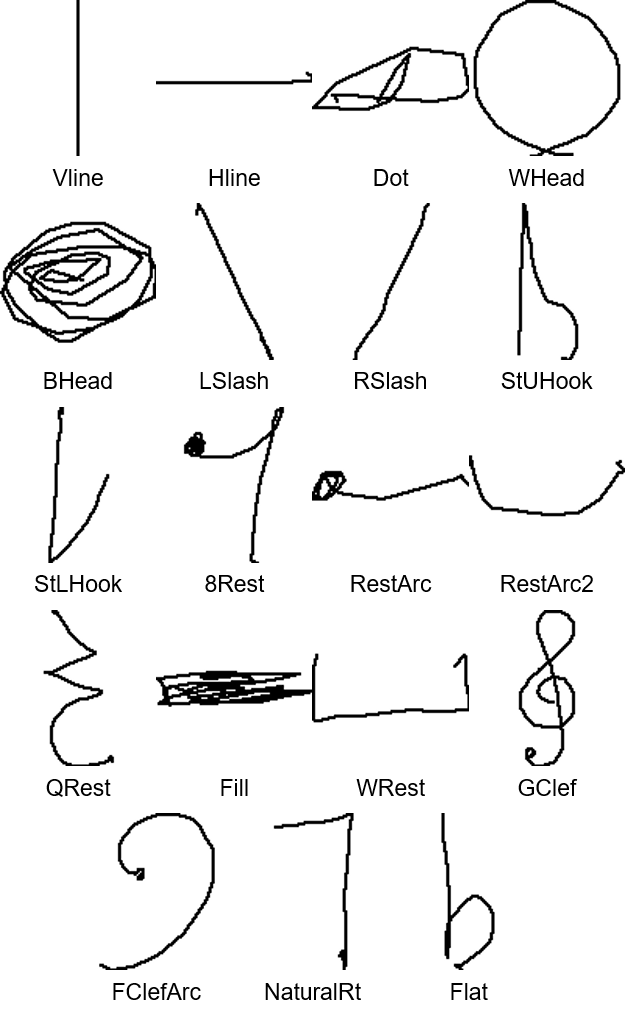SNU Dataset for Online Music Symbol Recognition
Download:
- SNU dataset
- The labels of strokes in SNU dataset
The Handwritten Online Musical Symbols (HOMUS) dataset<ref>J. Calvo-Zaragoza and J. Oncina, Recognition of Pen-Based Music Notation: the HOMUS dataset, ICPR 2014.</ref> consists of 15200 musical symbol samples collected from 100 musicians.
Each sample belongs to one of 32 symbols.
It can be download at the dataset homepage.
Each symbol sample in this dataset consists of at least one stroke and a stroke is defined as a sequence of two dimensional points, which are the successive locations of a stylus pen on a device in time sequence while the pen touches the device.
Nonetheless, the dataset does not serve labels corresponding to the strokes of symbols in the dataset.
Excluding 3200 symbol samples corresponding to 8 symbols of time signatures, we analyzed all of 31768 strokes in the other samples for 24 symbols as shown in Fig. 1 and chose 23 basic strokes in Fig. 2.
| Note | whole, half, quarter, eighth, sixteenth |
| Rest | whole/half, quarter, eighth, sixteenth |
| Accidentals | flat, sharp, natural |
| Clef | G-clef, F-clef |
| Others | dot, barline |
| Symbol | Num. of symboles | Symbol | Num. of symboles | ||
|---|---|---|---|---|---|
| 1 | BarLine | 263 | 9 | Natural | 80 |
| 2 | Dot | 81 | 10 | Quarter-Note | 108 |
| 3 | Eighth-Note | 142 | 11 | Quarter-Rest | 90 |
| 4 | Eighth-Rest | 71 | 12 | Sharp | 111 |
| 5 | F-Clef | 90 | 13 | Sixteenth-Note | 140 |
| 6 | Flat | 88 | 14 | Sixteenth-Rest | 72 |
| 7 | G-Clef | 147 | 15 | Whole-Half-Rest | 54 |
| 8 | Half-Note | 108 | 16 | Whole-Note | 71 |
In the choice, we tried to define as small number of the basic strokes as possible keeping the similarity between any pair of the strokes to be as small as possble, and each basic stroke was enforced to contain somewhat large variations.
With those basis strokes, we labeled all the strokes as one of the twenty four classes, which is summarized in Table 1.
Note that most samples corresponding to 24 symbols in Fig. 1 can be represented in the combinations of the basic strokes in Fig. 2.
Download the labels of strokes in HOMUS dataset (v1.0)
None stroke in Table 1 means the strokes that can not be categorized into any of the 23 basic strokes.
| Stroke label | Stroke | Num. of strokes | Stroke label | Stroke | Num. of strokes |
|---|---|---|---|---|---|
| 0 | None | 75 | 12 | RestArc | 52 |
| 1 | VLine | 914 | 13 | RestArc2 | 10 |
| 2 | HLine | 141 | 14 | QRest | 90 |
| 3 | CommonTimeArc | 0 | 15 | Fill | 52 |
| 4 | Dot | 268 | 16 | WRest | 6 |
| 5 | WHead | 174 | 17 | GClef | 141 |
| 6 | BHead | 357 | 18 | FClefArc | 98 |
| 7 | LSlash | 303 | 19 | CClef2Arc | 0 |
| 8 | RSlash | 151 | 20 | RevNaturalRt | 0 |
| 9 | StUHook | 1 | 21 | NaturalRt | 79 |
| 10 | StLHook | 119 | 22 | Lightning | 0 |
| 11 | 8Rest | 150 | 23 | Flat | 81 |
When labeling the samples of Dot symbol, some of the samples were regarded as None strokes not Dot stroke because their sizes were as large as BHead strokes, but this can be compensated in symbol recognition step, which was shown in a previous study<ref>H. Miyao and M. Maruyama, An online handwritten music symbol recognition system, International Journal of Document Analysis and Recognition, vol. 9, pp. 49-58, 2007.</ref>.
Each data file contains a name of symbol and the labels of its strokes in a similar manner that a symbol sample are written in a file. The only difference is that the stroke labels are included in the files instead of raw data of strokes. For consistency, the strokes of symbol samples corresponding to 8 time signatures are commonly labeled as 100.
We have developed an algorithm for online handwritten musical symbol recognition using the labels of strokes. The algorithm is specifically described in our paper<ref>J. Oh, S. J. Son, S. Lee, and N. Kwak, Online Recognition of Handwritten Music Symbols, to be submitted.</ref>.
References
<references />
Contact
Sung Joon Son, Ph.D. candidate, E-mail: sjson718_at_snu_dot_ac_dot_kr

